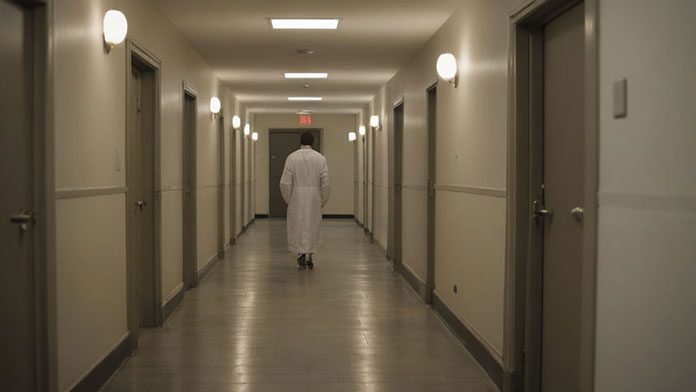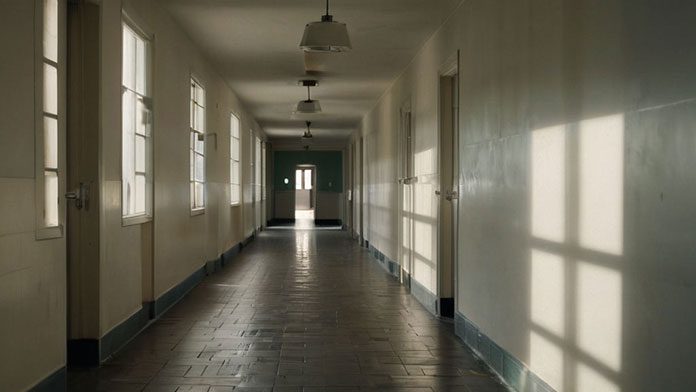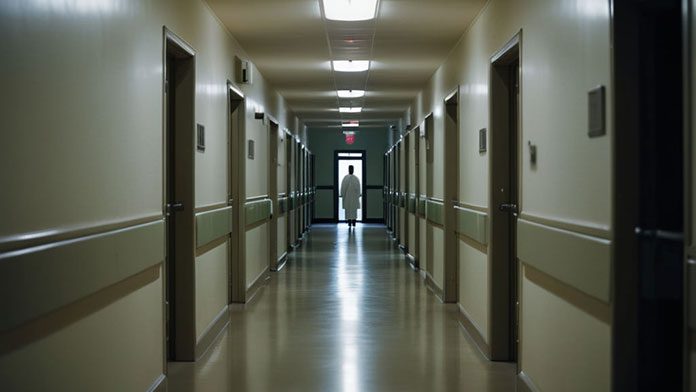Are you curious about how long the average stay is in a mental hospital? Let’s explore the data and uncover the factors that affect the length of stay.
From the impact of different mental health conditions to the treatment approaches used, we’ll dive into the objective information you need.
Plus, we’ll discuss the role of insurance, discharge planning, and long-term care options for extended stays.
Join us as we analyze the trends and changes in mental hospital stay lengths over time.
Table of Contents

Related Video: "How Long Is A Typical Stay At A Mental Hospital?" by Grievous Psychology
Main Points
– The length of stay in a mental hospital is influenced by factors such as the severity of the condition, availability of community resources, effectiveness of the treatment plan, insurance coverage, and access to mental health services.
– The average duration of stay for different mental health conditions varies, with depression typically lasting 1 to 2 weeks, anxiety disorders a few days to a week, and bipolar disorder a few weeks to a couple of months. Individual factors also play a role in the duration of stay.
– Treatment approaches that are successful and evidence-based, such as cognitive-behavioral therapy (CBT) and medication management, can lead to shorter stays by alleviating symptoms and promoting recovery. A collaborative and person-centered approach also improves outcomes and patient satisfaction.
– Discharge planning and transitioning to community care are crucial for a smooth transition after a mental hospital stay. Personalized discharge plans should address specific needs and goals, including referrals to outpatient therapy, medication management, support groups, and connections with housing options, vocational programs, and social services. Long-term care options may be considered for extended hospital stays.
Factors Affecting Length of Stay

The factors that affect your length of stay in a mental hospital can vary greatly. Several key factors have a significant impact on how long you may need to stay in a mental hospital.
One such factor is the severity of your condition. Individuals with more severe mental illnesses often require longer hospital stays to stabilize and receive appropriate treatment.
Another factor is the availability of community resources and support networks. If you have a strong support system in place, it may shorten your stay as you have a better chance of transitioning to outpatient care.
Additionally, the effectiveness of the treatment plan plays a crucial role. If your treatment is successful and you respond well to therapy and medication, your length of stay may be shorter.
Other factors such as insurance coverage, access to mental health services, and individual circumstances also impact the duration of your stay.
It’s important to note that each individual’s situation is unique, and various factors interact to determine the length of stay in a mental hospital.
Average Duration for Different Mental Health Conditions

For individuals with different mental health conditions, the average duration of their stay in a mental hospital can vary depending on the severity and type of their condition. Understanding the average duration for different mental health conditions is crucial for both patients and healthcare providers to effectively plan treatment and ensure patient satisfaction.
Here are some key insights:
– Depression: On average, individuals with depression may stay in a mental hospital for approximately 1 to 2 weeks. However, the duration may be longer for severe cases or if there are complications.
– Anxiety disorders: The average duration for individuals with anxiety disorders is typically shorter, ranging from a few days to a week. This is because anxiety disorders often respond well to treatment and individuals can experience significant improvement in a relatively short period.
– Bipolar disorder: Due to the complexity and chronic nature of bipolar disorder, the average duration of stay is usually longer, ranging from a few weeks to a couple of months. This allows for comprehensive assessment, stabilization, and medication adjustments to ensure treatment effectiveness.
It is important to note that these durations are averages and can vary depending on individual factors. The primary goal of mental hospitals is to provide the necessary treatment and support until patients are stabilized and ready for transition to outpatient care.
Impact of Treatment Approaches on Length of Stay

Consider how different treatment approaches can impact the length of your stay in a mental hospital. The effectiveness of treatment plays a crucial role in determining the duration of your hospital stay. When treatment approaches are successful in addressing your mental health condition, the length of your stay may be shorter. Effective treatments can help alleviate symptoms, improve functioning, and promote recovery, leading to a reduced need for hospitalization.
Patient satisfaction also influences the length of stay in a mental hospital. When individuals feel satisfied with the treatment they receive, they may be more motivated to actively engage in their recovery process. This can lead to better treatment outcomes and a shorter duration of hospitalization.
Research has shown that evidence-based treatments, such as cognitive-behavioral therapy (CBT) and medication management, have been effective in reducing the length of hospital stays for individuals with various mental health conditions. These treatments focus on addressing specific symptoms and providing individuals with skills to manage their condition outside of the hospital setting.
Additionally, a collaborative and person-centered approach, where treatment decisions are made in partnership between the individual and their healthcare team, has been associated with improved treatment outcomes and potentially shorter hospital stays.
Understanding the Role of Insurance in Hospital Stay Length
Understand how insurance coverage impacts the length of your hospital stay. Insurance coverage plays a significant role in determining the duration of your stay in a mental hospital. Here are three key factors to consider:
– Type of Insurance: Different insurance plans have varying coverage and limitations. Some plans may only cover a specific number of days or may require pre-authorization for an extended stay. Understanding the details of your insurance plan can help you anticipate any potential limitations on your hospital stay.
– Medical Necessity: Insurance companies typically evaluate the medical necessity of hospital stays. They assess whether the treatment provided in the mental hospital is essential for your well-being. If the insurance company deems the treatment unnecessary or not covered under your plan, it may result in a shorter stay or denial of coverage.
– Financial Implications: Insurance coverage directly impacts the financial burden of your hospital stay. Depending on your plan, you may be responsible for co-pays, deductibles, or a percentage of the total cost. It’s essential to review your insurance policy and understand your financial obligations to avoid unexpected expenses.
Understanding your insurance coverage is crucial for managing the length of your hospital stay and the associated financial implications. Consult with your insurance provider and mental healthcare professionals to ensure you have a clear understanding of the coverage and any potential limitations.
Discharge Planning and Transitioning to Community Care
When you’re ready to leave the mental hospital, your healthcare team will assist you in developing a discharge plan and transitioning to community care. Discharge planning is a crucial process that ensures a smooth transition from the hospital to the community. It involves creating a personalized plan that addresses your specific needs and goals. The healthcare team will collaborate with you and your family to identify the appropriate community resources and support services that will facilitate your recovery and promote community integration.
The discharge plan may include referrals to outpatient therapy, medication management, and support groups. It may also involve connecting you with housing options, vocational rehabilitation programs, and social services that can assist you in rebuilding your life outside of the hospital. The goal of discharge planning is to provide you with the necessary tools and support to continue your journey towards mental wellness in a community setting.
Transitioning to community care is a significant step in your recovery process. It involves gradually shifting from the structured environment of the hospital to the more independent and self-directed nature of community living. The healthcare team will work closely with you during this transition period, ensuring that you have access to the resources and services you need to thrive in the community. They’ll monitor your progress, provide ongoing support, and make any necessary adjustments to your care plan to ensure your continued success in the community.
Long-Term Care Options for Extended Hospital Stays
If your stay in a mental hospital extends beyond the average duration, there are long-term care options available to support your ongoing treatment and recovery. When managing extended stays, it’s important to consider the following long term care alternatives:
– Residential Treatment Programs: These programs provide a structured environment for individuals with mental health conditions to receive ongoing care and support. They offer a range of services, including therapy, medication management, and life skills training. Residential treatment programs can be highly beneficial for individuals who require intensive support and supervision.
– Psychiatric Group Homes: These homes are designed to provide a supportive living environment for individuals with mental illnesses. They offer a combination of housing and mental health services, allowing individuals to receive ongoing care while maintaining a level of independence. Psychiatric group homes often have staff available 24/7 to provide support and assistance as needed.
– Assisted Living Facilities: Assisted living facilities are a suitable option for individuals who need help with activities of daily living but don’t require the level of care provided in a nursing home. These facilities offer a safe and supportive environment, along with assistance with medication management and personal care. They also provide opportunities for social engagement and recreational activities.
Trends and Changes in Mental Hospital Stay Lengths Over Time
To understand the trends and changes in mental hospital stay lengths over time, you need to examine the data and statistics regarding patient admissions and discharges. By analyzing this information, we can gain valuable insights into the factors that influence the duration of stays in mental hospitals.
One important aspect to consider is the treatment effectiveness in mental hospitals. As new therapies and interventions are developed, the length of hospital stays may be affected. If treatments prove to be more efficient and successful, patients may require shorter stays to achieve their desired outcomes. Conversely, if treatment options are limited or less effective, patients may need longer stays to receive the necessary care and support.
Another factor that can impact the length of mental hospital stays is patient satisfaction. A positive patient experience can lead to better treatment outcomes and potentially shorter stays. When patients feel heard, respected, and involved in their treatment plans, they’re more likely to actively participate and engage in their recovery process. This can contribute to a faster and more successful recovery, resulting in shorter hospital stays.
Understanding the trends and changes in mental hospital stay lengths over time is crucial for identifying areas of improvement in the mental healthcare system. By closely monitoring treatment effectiveness and prioritizing patient satisfaction, we can strive to provide the best possible care and support for individuals in need of mental health services.
Frequently Asked Questions
Are There Any Specific Factors That Can Influence the Length of Stay in a Mental Hospital?
Factors such as severity of illness, response to treatment, availability of community resources, and support systems can impact the length of stay in a mental hospital. Treatment approaches that focus on stabilization and rehabilitation may shorten the hospital stay.
How Does the Average Duration Differ for Various Mental Health Conditions?
The average duration of stays in mental hospitals can vary depending on the specific mental health condition. Factors such as severity, treatment effectiveness, and individual circumstances all contribute to the length of stay.
What Impact Do Different Treatment Approaches Have on the Length of Stay in a Mental Hospital?
Different therapy options and the impact of medication can greatly affect the length of your stay in a mental hospital. It's important to explore and discuss these treatment approaches with your healthcare provider.
Can You Explain the Role of Insurance in Determining the Length of Hospital Stay for Mental Health Patients?
Insurance plays a significant role in determining the length of hospital stay for mental health patients. Factors like coverage limitations, pre-authorization requirements, and reimbursement rates can influence the duration of treatment.


